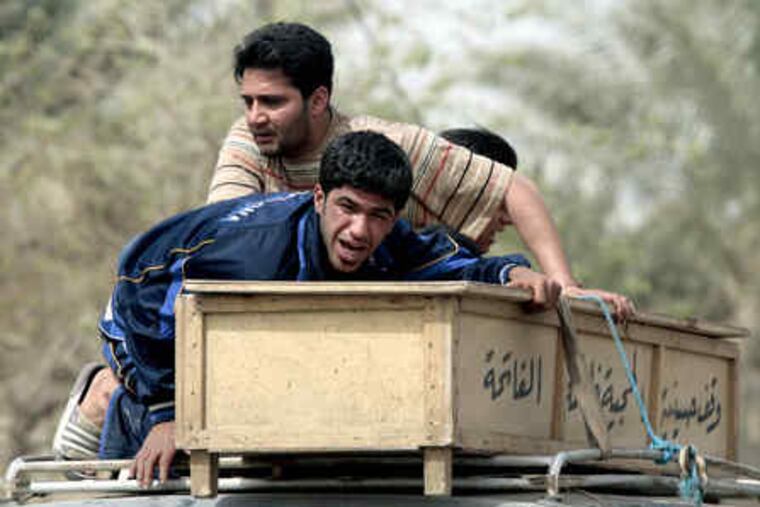12,000 U.S. soldiers to leave Iraq by Sept.
It is the first step in Obama's withdrawal strategy. A suicide bombing underscored Baghdad's turbulence.

BAGHDAD - The U.S. military announced yesterday that 12,000 U.S. soldiers would withdraw from Iraq by September, marking the first step in the Obama administration's plan to pull combat forces out of the country by August 2010.
In setting the deadline last month, President Obama declared that the United States would restrict itself to achievable goals before departing, and the timing of yesterday's announcement underscored that Iraq is likely to remain dangerous, turbulent, and vulnerable to spectacular acts of bloodshed during an American withdrawal.
Only hours before the announcement, a suicide bomber on a motorcycle plowed into a crowd gathered at the entrance of the police academy in Baghdad, killing 28 people and wounding dozens more. Survivors recounted scenes of mayhem and carnage in the bombing's aftermath, as ambulances tried to force their way through snarled traffic and police fired in the air - either in confusion or, fearing a second bomb, to try to disperse people.
By afternoon, there was little sign of the attack, save for the shattered glass that littered the asphalt. A tattered poster left over from January's municipal elections hung from a bridge pillar. "With the blood of our martyrs, Iraq is liberated," it read.
Under the administration's plan, major reductions in the more than 130,000 troops in Iraq would be postponed until after elections in December to choose a new parliament, a vote that nearly everyone in the country sees as a potential watershed moment.
A U.S.-Iraqi agreement negotiated last year requires all U.S. troops to depart by the end of 2011, a deadline that Iraqi officials reiterated yesterday.
"The Iraqi government has no intention to accept the presence of any foreign troops or bases after 2011," said Ali al-Dabbagh, a government spokesman.
But long before then, the posture of the U.S. military will have changed dramatically. Under the U.S.-Iraqi agreement, U.S. troops must leave Iraqi cities by the end of June, and Maj. Gen. David Perkins said that two combat brigades scheduled to leave by September would not be replaced.
That would reduce the number of combat brigades in the country from 14 to 12. An F-16 squadron, along with some support units, also will depart, as will the remaining 4,000 British soldiers, who are based in southern Iraq.
At their peak, U.S. troops numbered more than 165,000. As many as 50,000 U.S. troops will remain in Iraq, even after combat troops leave, to conduct training and what officials describe as counterterrorism operations.
"We are by no means complacent," Perkins, spokesman for U.S. forces in Iraq, said in announcing the withdrawal. "We know that al-Qaeda, although greatly reduced in capability and numbers, still is desperate to maintain relevance here."
Perkins said remaining troops would be redeployed around the country. Although attacks have diminished dramatically, parts of Iraq remain remarkably violent.
An insurgency still rages in the northern city of Mosul, along one of the country's ethnic fault lines. Diyala province, with its mix of Sunni and Shiite Arabs, along with Kurds, has remained dangerous, despite repeated Iraqi and U.S. offensives to quell fighting there.
"We will not leave any seams in regards to security," Perkins said. "We know how to do this. This is not the first time we've reduced our forces."
Even Iraqis adamant about ending the U.S. presence, which began when the United States invaded and occupied the country in April 2003, worry that violence may grow worse amid the withdrawal. Echoing a view often repeated by the military, Perkins suggested that such high-profile attacks were a sign of desperation after the success of January's elections and the negotiation of the U.S.-Iraqi agreement.
"When al-Qaeda senses that it is under extreme pressure and it is losing momentum, it works very hard to gain relevance and to regain momentum," he said.
In yesterday's attack, the assailant detonated bombs that were strapped to both his body and the motorcycle in a heavily guarded part of Baghdad that is home to the Oil Ministry and other military and government offices. The entrance was fortified with blast walls, but the crowd, standing about 20 feet away under a bridge, was exposed to the traffic.
The men had gathered outside the academy in hopes of becoming recruits. Survivors said police had left them waiting in the street for more than two hours without any instructions, and some expressed anger at their vulnerability.
"Why would they leave them outside?" one man asked. Why leave them in the street? It's so dangerous out there."